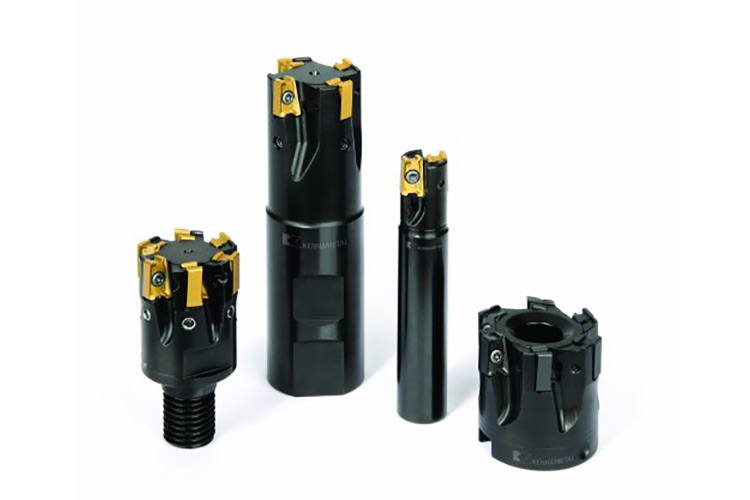With a unique insert geometry and extremely accurate pocket positioning, the Mill 4-11 offers the free cutting action of a single-sided insert at the low cost per edge of a double-sided. The Mill 4-11 is also available in a variety of mounting options, with cutter diameters ranging from 16 mm (0.625 in.) to 80 mm (3.000 in.) The issue with many square shoulder indexable milling cutters is the stair-step effect they leave on workpiece walls.
 Two years ago, Kennametal introduced a double-sided 90º milling platform that eliminates this issue while providing manufacturers a cost-effective machining solution to boot. The Mill 4™ Series of indexable shoulder mills is now a proven performer, offering high metal removal rates, excellent tool life, and surface finish that frequently eliminates semi-finishing operations—and in some cases, can even be used as a finishing cutter, reducing reliance on expensive solid carbide end mills.
Two years ago, Kennametal introduced a double-sided 90º milling platform that eliminates this issue while providing manufacturers a cost-effective machining solution to boot. The Mill 4™ Series of indexable shoulder mills is now a proven performer, offering high metal removal rates, excellent tool life, and surface finish that frequently eliminates semi-finishing operations—and in some cases, can even be used as a finishing cutter, reducing reliance on expensive solid carbide end mills.
Kennametal is expanding its game-changing Mill 4 family with a new cutting tool, the Mill 4-11. Designed for smaller machining centers, the Mill 4-11 accommodates 40-taper CAT and BT, HSK50, and similarly-sized spindles. Due to its free-cutting capabilities, it is ideal for successful metal removal in less-than-rigid setups and on light-duty machine tools, multitaskers and live-tool lathes.
Tim Marshall, Senior Global Product Manager for Indexable Milling, says the Mill 4-11 enjoys the same strong insert design as its larger cousin, the Mill 4-15, but is 24 % shorter and 34% narrower. With an 11 mm (0.433 in.) maximum cut length, this addresses the needs of those job shops and manufacturers producing smaller parts and part features while still offering high metal removal rates and excellent tool life.
“What’s unique about it is the step down,” says Marshall. “Because of the insert design and precision, there’s very little mismatch between passes—for example, using a 63 mm diameter tool (2.48 in.) and our SGE geometry, we were able to achieve less than 8µm (0.00003 in.) deviation between successive 6 mm (0.236 in.) deep passes. One of our largest automotive customers completely eliminated a finishing operation on a steel alloy housing because of it, saving them many thousands of dollars annually.”
Scott Etling agrees. The Director of Global Product Management for Indexable Milling, he says the Mill 4-11 platform offers a full complement of grades and geometries. “KCPM40 is our go-to grade for most steel applications and our newest KCSM40 is our first choice in aerospace and medical machining. Of course we have cast iron and aluminum grades, and a variety of edge preps and corner radii up to 1.6 mm (0.062 in.) as well. We’re very proud of this new offering.”
The Mill 4-11 is also easy to use. Each insert is securely locked in place with a single M3 screw, and marked with a series of dimples to indicate geometry and insert style. Marshall recommends customers keep the tool clean and the screws lubricated with a small amount of grease, and says it’s a good idea to mount all of the inserts with the dimples or markings facing the same direction. “This improves accuracy during indexing, no matter whose cutting tools you’re using.”
The cutter has uneven pocket spacing designed to break up machine harmonics and reduce chatter. Because of its complex insert geometry and positive placement in the pocket, it has an effective radial rake angle between 1° to 11°, depending on the cutter diameter, and an axial rake angle of 3°, this despite the Mill 4-11’s double-sided design.
When taking cuts up to approximately 6.5 mm (0.255 in.) axial engagement, the cutter is essentially “stepless”, although Marshall says cuts up to 11 mm deep (0.433 in.) are possible while still maintaining square, smooth walls. Best of all, it removes material quickly. “We’ve performed extensive testing,” Marshall says. “Time and again we beat the competition, in some cases by 35% greater metal removal rates and 40% or longer tool life. It’s quite simply a great addition to our portfolio.”
The Mill 4-11’s has a complex, double-sided geometry that provides low cutting forces for light duty machine tools and less-than-rigid setups, and one of the lowest tooling costs per part in the industry


